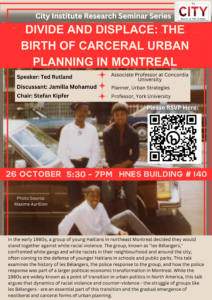Divide and Displace: The Birth of Carceral Urban Planning in Montreal

Abstract:
In the early 1980s, a group of young Haitians in northeast Montreal decided they would stand together against white racial violence. The group, known as "les Bélangers," confronted white gangs and white racists in their neighbourhood and around the city, often coming to the defense of younger Haitians in schools and public parks. This talk examines the history of les Bélangers, the police response to the group, and how the police response was part of a larger political-economic transformation in Montreal. While the 1980s are widely known as a point of transition in urban politics in North America, this talk argues that dynamics of racial violence and counter-violence - the struggle of groups like les Bélangers - are an essential part of this transition and the gradual emergence of neoliberal and carceral forms of urban planning.
The talk draws on the recently published book, Out to Defend Ourselves: A History of Montreal's First Haitian Street Gang, and is accompanied by reflections from Toronto-based scholar and urban planning, Jamilla Mohamud.
Speaker: Ted Rutland
Associate Professor, Geography, Planning and Environment, Concordia University, Montreal.
Ted is a human geographer and interdisciplinary scholar focused on municipal politics, urban planning, and urban security in Canada. He approaches this work with an interest in social and racial justice, and often draw on relevant work in Black studies and Black geographies to document how ideas about "race" shape dominant urban policies and practices, and how social and racial justice movements imagine and seek to create different urban worlds.
Discussant: Jamilla Mohamud
Planner, Urban Strategies
Jamilla is a Registered Professional Planner, researcher and writer with experience working on a range of issues including affordable housing, health equity and gendered rights to the city. Prior to joining the firm, Jamilla developed public health policy recommendations to enable healthier outcomes for communities, supported city-wide public consultations on proposed Inclusionary Zoning policy and contributed to the design and implementation of post-secondary student consultation strategies.
Chair: Stefan Kipfer
Professor, Faculty of Environmental & Urban Change, York University
Stefan Kipfer's empirical research has focused on urban-regional politics and planning in transnational and comparative context. In second-tier global cities in North America and Europe (Zurich, Toronto and Paris), he has researched the role of urban social movements and local-regional politics and planning in processes of transnational urban restructuring since the late 1960s. His research on Toronto has been particularly interested in the impasse of regional planning and the formation of a 'competitive city' planning regime characterized by neoliberalism, revanchism and cultural-differential aspects of 'diversity management' (including multiculturalism).

